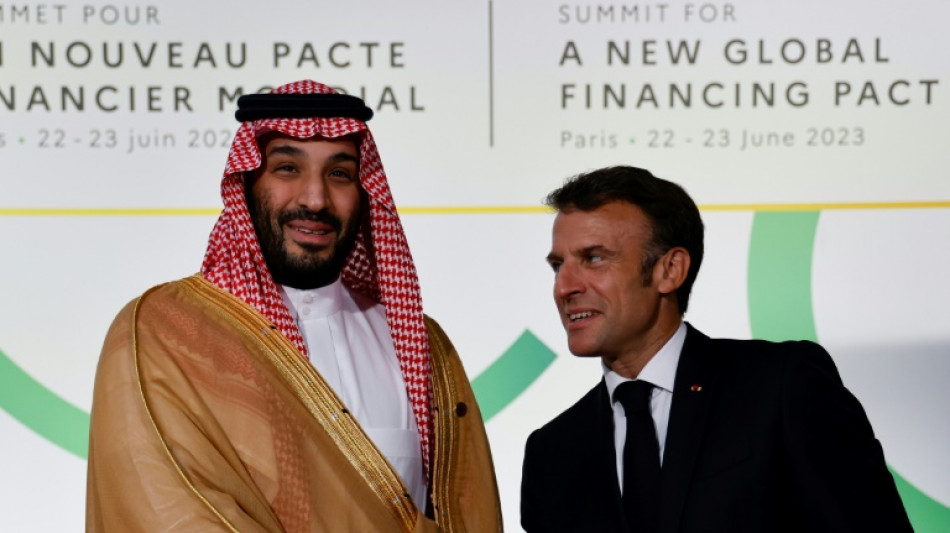

Climate: Paris summit vets revamp of global lending institutions
The leaders of France and Barbados, joined by other leaders and the heads of multilateral development banks, pushed Thursday for an overhaul of the international financial system to better tackle poverty, climate change and other 21st-century challenges.
French President Emmanuel Macron, hosting the two-day summit in Paris, invited Barbadian Prime Minister Mia Mottley to co-headline the event, which seeks to improve the lending system for developing countries.
The summit comes amid growing recognition that curbing global warming at tolerable levels will require a massive increase in clean energy investment in poor and emerging economies.
Macron called for a "public finance shock" to catalyse the decarbonisation of the global economy and help countries climb out from under a mountain of debt.
"Policymakers and countries shouldn't ever have to choose between reducing poverty and protecting the planet," he said.
A "polycrisis" borne of Covid-19, Russia's invasion of Ukraine, spiking inflation and the spiralling cost of climate-enhanced weather disasters has thrown many nations deep into debt.
More than 50 nations are now in or near debt default, while many African countries are spending more on debt repayments than on healthcare, UN head Antonio Guterres told the conference.
Speaking to leaders of major oil and gas economies such as Saudi Arabia's Crown Prince Mohammed bin Salman, Ugandan climate campaigner Vanessa Nakate slammed the fossil fuel industry as the main driver of carbon pollution.
"Please do not tell us that we have to accept toxic air and barren fields and poisoned water so that we can have development," she said.
Mottley, whose Caribbean island nation is threatened by rising sea levels and tropical storms, has emerged as a powerful advocate for redefining the role of the World Bank and International Monetary Fund in an era of climate crisis.
- 'Future of humanity' -
"What is required of us now is absolute transformation and not reform of our institutions," Mottley said.
Last year Barbados put forward a detailed plan to help developing countries invest in clean energy and boost resilience to climate impacts.
"Failure to appreciate that there is no equivalent example in the last 80 years of this polycrisis moment means we will continue to bury our heads in the sand and allow countries to implode," Mottley told a roundtable.
France has pitched the conference as a consensus-building exercise, but Day One delivered a few tangible progress.
IMF director Kristalina Georgieva confirmed a pledge to shift $100 billion of "special drawing rights" into a climate and poverty fund had been met.
"Ultimately it is the future of humanity that is being discussed here," she told reporters.
Separately, a group of wealthy nations and multilateral development banks promised to mobilise 2.5 billion euros ($2.7 billion) to help Senegal reduce its dependence on fossil fuels, President Macky Sall announced.
The deal is the most recent in a series of so-called "just energy transition partnerships", with $8.5 billion promised to help South Africa wean itself of coal-fired power, $20 billion for Indonesia and $15.5 billion for Vietnam.
Also on Thursday, the incoming head of the World Bank, Ajay Banga, said the lender planned to introduce a "pause" mechanism on repayments for debtor countries hit by crises.
Zambia's lenders, meanwhile, agreed to restructure the country's public debt, providing financial relief to the first African nation to default after the Covid pandemic.
- Big ideas -
Macron also expressed optimism that a 2009 pledge to deliver $100 billion a year in climate finance to poorer nations by 2020 would finally be fulfilled this year.
Earlier in the week, the International Energy Agency (IEA) said annual investment for clean energy in poor and emerging economies, excluding China, must jump to nearly $2 trillion within a decade to keep alive the Paris Agreement goal of limiting global warming to "well below" two degrees Celsius since pre-industrial times -- and below 1.5C if possible.
Ideas for how to turn "billions to trillions" for climate and development goals include using multilateral development banks to help unlock climate investments, as well as taxation on fossil fuel profits and financial transactions.
France backs the idea of an international tax on carbon emissions from shipping, with hopes of a breakthrough at a meeting of the International Maritime Organization in July.
"We want something that lays the groundwork for the beginning of a consensus in Paris on all these issues," an aide to Macron said.
"The planet is not dying, it's being killed," she said. "And we know who are the people killing it."
Thursday night Billie Eilish was to perform at Global Citizen's "Power Our Planet" concert, lending star appeal to a macroeconomic niche unused to such a limelight.
L.Lawrence--MC-UK



